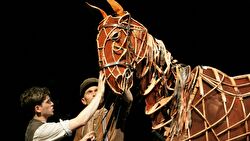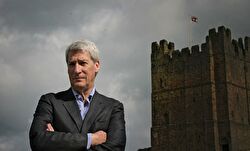
If you put the term “House of Windsor” into Google, the first question in the “People Also Ask” section is “Is the Queen of England German?” Algorithms do not lie, so lots of people must harbour doubts. The answer is that of course she’s not German: her aristocratic British mother’s birth was registered in Hitchin, a market town in Hertfordshire known mainly for being the scene of the worst hailstorm in British history in 1697. It is decidedly not in Germany.
But the Queen is partly German. The House of Windsor is really the House of Saxe-Coburg-Gotha. One hundred years ago this summer, in July 1917, George V issued a proclamation larded with many a “whereas” and “declare” to announce that henceforth all male descendants of Queen Victoria were to be known by the new surname of “Windsor”.
George’s cousin, the German Kaiser, remarked that he was looking forward to watching a performance of “The Merry Wives of Saxe-Coburg”.
“Windsor” had not been the only possibility: courtiers had toyed with Plantagenet, York, Lancaster, England and even Fitzroy, though “Fitz” usually signified illegitimacy. But Windsor it was, with various German-sounding titles of minor royals being discarded in favour of “Mountbatten”, “Cambridge” or “Milford Haven” and Queen Mary’s younger brother, Prince Alexander of Teck, becoming the Earl of Athlone.
During the 19th century, there were so many minor dynasties in Germany that it had become the first port of call for anyone looking for an additional decoration for their coat of arms. Bismarck deemed the Coburgs “the stud farm of Europe” and Prince Albert of Saxe-Coburg and Gotha sired from Queen Victoria children, grandchildren and great- grandchildren who would occupy palaces in Greece, Norway, Denmark Russia, Sweden, Romania, Yugoslavia and Spain, as well as Germany.
The cousinage had some odd consequences, so that regiments on opposite sides in the first world war had colonels in chief fighting for the enemy. In 1914, the fire-breathing Kaiser himself had been an honorary admiral in the Royal Navy, as well as an honorary army field marshal.
But when British citizens were being killed by Germans, a royal family with a foreign name was a problem. In the early days of the war, concerned citizens had seen German fifth columnists everywhere, including an artist who had rented a cottage in the West Country, on the grounds that “if he’s not a spy, why does he wear a hat like that?” Shops with German names had been looted and even, it was said, a dachshund stoned by dim-witted patriots.
As the war dragged on, the royal family clung to its continental origins, unaware that Prime Minister David Lloyd George had remarked as he set off for his audience with the king: “I wonder what my little German friend has got to say to me.”
In fact, the royal family identified with the British people. George V’s decision to turn the gardens of Buckingham Palace over to cabbages was hardly sharing the hunger caused by the U-boat blockade, but it was a gesture, in much the same way as his daughter-in-law, Queen Elizabeth The Queen Mother, talked of the 1940 bombing of Buckingham Palace as enabling her to “look the East End in the face”.
The 1917 decision that had given her and the present queen their new dynastic title had been a small thing: what’s in a name?
But it marked the point at which British royalty finally bent the knee to the people it purported to lead. Neither the German nor Russian monarchies survived the first world war. But Britain is still ruled by a member of the House of Windsor. She has no real power and her advisers have been wise enough to see that is how it has to be.
In George V, the moment had met the man. Let HG Wells stand for the sniffy intellectuals — one of the worst categories of British snob, because they recognise how cordially the English detest “thinkers” — who sneered at the “alien and uninspiring court”. George V replied “I may be dull but I’m damned if I’m an alien”.
George was certainly a dull man. But a modern democracy does not need a head of state — there by mere accident of birth, let us recall — who thinks they know something and is willing to abuse their position to lecture the rest of us on why they are right. One of George’s more self-important biographers wrote dismissively of the king’s early married life that for 17 years, “he did nothing at all but kill animals and stick in stamps”. What, exactly, is the problem? If only the Kaiser and Hitler had stuck to well-shot woodcock and first-day covers.
So, yes, the Queen is partly German. So what? She belongs to a family that realised a century ago that names matter less than behaviour.


